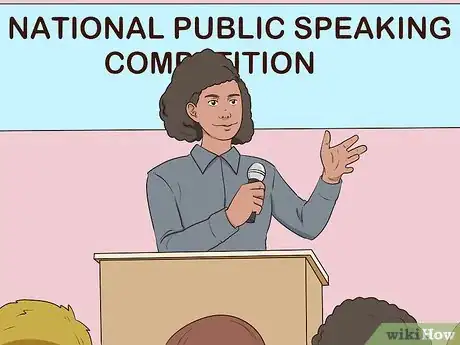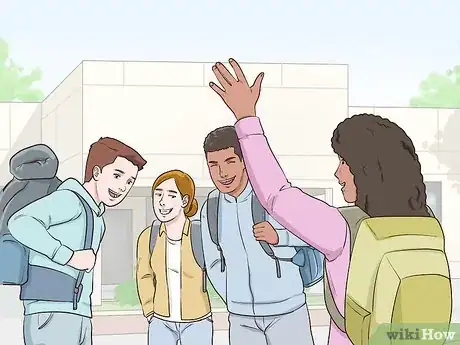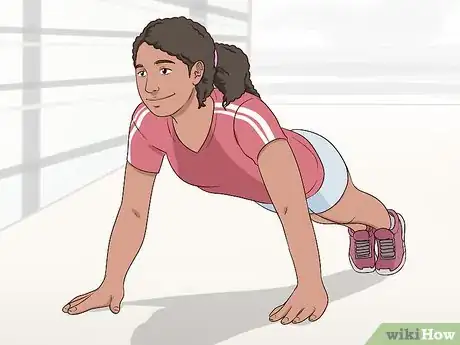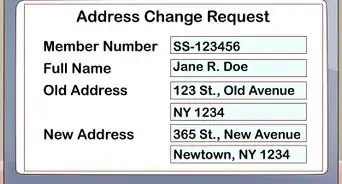This article was co-authored by Trudi Griffin, LPC, MS. Trudi Griffin is a Licensed Professional Counselor in Wisconsin specializing in Addictions and Mental Health. She provides therapy to people who struggle with addictions, mental health, and trauma in community health settings and private practice. She received her MS in Clinical Mental Health Counseling from Marquette University in 2011.
There are 14 references cited in this article, which can be found at the bottom of the page.
This article has been viewed 79,582 times.
Your teenage years can be tricky--there’s a lot to learn, and it may seem like you need to come up with a life plan as soon as possible. However, don’t forget that your teenage years are a time for exploration and discovery. In fact, with the right mindset, you can learn a lot about yourself, your passions, and the world, all while having a blast.
Steps
Developing a Sense of Self
-
1Be true to yourself. Trust your values, feelings, and opinions, even when you’re afraid that doing so will lead to rejection. This is especially hard as a teen, when fitting in can feel really important. However, being true to yourself comes with tons of benefits, including higher self-confidence, more satisfying relationships, and a greater likelihood of achieving your goals.[1]
- Pursue goals or activities that are meaningful to you, regardless of what others think.
- Do your best to stand up for what you believe in, even if your opinion is unpopular.
-
2Don’t be afraid to make mistakes. If you never fail, you’ll never learn and grow. Don’t be afraid to try new things, and embrace failure as a learning opportunity. Take risks, like entering your school’s talent show, trying out for a sports team, or asking out your crush.[2]
- Realize people usually believe their mistakes will have worse outcomes than they actually do.
- When you feel yourself stressing about making a mistake, take a step back and consider the mistakes you’ve made in the past. Chances are, you were able to overcome the mistake. It may have even been a positive experience!
Advertisement -
3Pick a fear and conquer it. Everyone has something that scares them. Pick one of your fears, and address it head on. It doesn’t have to be anything crazy--many times, fears are small, like getting a job, or going to a new place alone.[3]
- For example, if you are afraid of public speaking, take a class that forces you to give an oral presentation.
-
4Get involved in activities that interest you. Maybe you’re intrigued by cinema. Start a film critic blog or take a film class. If you’re an avid reader, join a book club, or start writing a short novel of your own. Exploring your interests now will help you find the things that inspire you in life. It can also give you ideas for potential career paths.[4]
- Taking up a hobby is a great way to explore a particular interest.
- As a bonus, getting involved in interesting activities can connect you with cool, like-minded people.
Surrounding Yourself with the Right People
-
1Surround yourself with quality friends. Having good friends is important for mental and physical health.[5] What’s more, your friends influence your behavior. If you choose kind and motivated friends, chances are you’ll become more kind and motivated, too.[6] Most importantly, have fun with your friends, whether that means playing video games in your basement or going on a spontaneous road trip.
- No matter how busy you are, always take time to nurture your friendships. Be proactive--don’t always wait for your friends to reach out to you.
- If you’re having trouble finding a good group of friends, try joining a club or other extracurricular activity that interests you! Shared interests can provide a great foundation for friendship.[7]
-
2Befriend a teacher or professor. They can act as a valuable mentor, giving you advice on college, potential careers, and life in general. Plus, students who befriend their teachers are more likely to experience academic success. Pick a teacher who you connect with on a personal level or who teaches a subject you like.[8]
- Start by showing up to class prepared and ready to learn.[9]
- Schedule a one-on-one meeting with your teacher. You can discuss things like your progress in the class, career opportunities in the teacher’s subject area, or college. Ask them about their experiences in school and how they arrived at their current job.[10]
- Keep in mind that teachers don’t just love to talk about what they teach. They also enjoy sharing their knowledge with students, including their life experience. Your teachers may give you new insights into the world and even into your potential.
-
3Take time for your family. By the end of your teenage years, you may have moved out of your home, which means you’ll see your family less. Enjoy the time you have with them now. Set some time aside each day to hang out with your parents and siblings. Plan fun trips and activities on the weekends, like family putt putt golf, or a day at a theme park.
-
4Fall in love. Falling in love can be an incredible, confusing, and overwhelming experience. Besides being a blast, being in a romantic relationship can teach you a lot about communication and intimacy. Don’t be afraid to put yourself out there if you want a romantic relationship. Remember, rejection is also important for growth. If you aren’t interested in romance right now, that’s ok, too.[11]
- Seek out healthy romantic relationships, characterized by trust, honesty and respect. Avoid unhealthy relationships, which are marked by control, dishonesty, possessiveness, and physical or verbal abuse.
Learning About the World and Having Fun
-
1Travel. Whether you take a cross country road trip or visit a new continent, travel can help open your mind by exposing you to new cultures, people, and places. Travel can also boost your creativity and strengthen your sense of self.[12]
- You can travel domestically or internationally--both produce benefits. The important thing is that you get out of your comfort zone and experience a way of living that’s different from your own.
- You can do a solo trip or go with friends--both can be extremely rewarding.
- Don’t just limit yourself to tourist travel, though. Working with a community organization that goes to other countries, like the Peace Corps (if you’re over 18), can be an incredibly humbling way to see new places and cultures.
-
2Wander around your hometown. After you grow up and move out, you may never live in your hometown again. Kind of a scary thought, right? Take the time now to explore the area where you grew up. Go to stores, parks, or museums you’ve never visited before.[13]
- Ask friends, relatives, and parents for any special or interesting places that they think you should visit.
-
3Learn to drive. Yes, there are lots of ways to get around without learning to drive, but driving provides a unique sense of freedom. Plus, it’s harder to learn as an adult.[14]
- If you don’t have a car, you can still learn to drive. Look for a driver’s ed program in your area, or ask a friend’s parents or other trusted adults to help.
-
4Vote. Depending on where you live, you’ll likely gain the right to vote at some point in your teenage years. Take advantage of it. Involving yourself in the political process and voicing your opinion is not only informative, but also empowering.[15]
-
5Get fit. You’re only young once, so take advantage of your body while it’s in its prime! Consider starting a regular workout regimen or joining a sports team. An hour of physical activity each day is ideal. Challenging yourself physically not only gets you in shape, but can help improve your mood and mental functioning.
- Try to come up with a fitness-related goal and work towards it. You might want to run a 5K, learn how to play tennis, or master a back handspring.[16]
-
6Have fun! You may feel pressure to accomplish certain athletic, academic, or professional goals as a teen, but don’t forget to have fun. This is a time of life when you’re free to explore your passions and interests with few responsibilities. While it’s important to think about your future, it’s also important to live in the present. Don’t be afraid to give yourself a break, let loose, and spend time with friends.
- Being ambitious is great, but doing too much can actually be bad for you. Too many activities may leave you feeling stressed, overwhelmed, or even depressed.[17]
Setting Yourself up for Success
-
1Challenge yourself in school. Working hard and staying focused in high school and college is important for professional success and can give you insight into your ideal career path. Don’t shy away from difficult classes. At the same time, don’t completely overwhelm yourself with coursework. Try to find a balance of challenging and interesting courses.[18]
- For instance, try taking several AP or honors classes that interest you, but throw in some fun classes, like photography, as well.
- Take a second (or third) language. Learning languages is hard, but it can also be fun and teach you different ways of seeing the world. Learning German, or Chinese, or Arabic will introduce you to new words, but also new perspectives, new people, and new cultures.
-
2Keep an open mind when it comes to your career path. You may think you know what you want to do professionally, but it’s important to keep your options open. As you gain new experiences, professional and otherwise, your plan for the future may change.[19]
- Don’t let family members or friends pressure you into picking a certain career. If you feel yourself giving in, remember that letting others choose a career for you can lead to regret and unhappiness down the line.
- Don’t worry if you are unsure of your career path--that’s completely normal. Many teens don’t know, and those who do often change their minds.
-
3Earn your own money. Making money is not only practical, but gives you a sense of freedom and accomplishment while instilling a strong work ethic. Find an after-school or summer job. You might babysit, work as a waitress, coach a soccer camp, or find an internship.[20]
- If you’re unsure of your career path, try getting a summer job or internship in a field of professional interest. It can get you one step closer to figuring out what you want to do.[21]
- Even if you’re busy, you may be able to get a part-time job.
-
4Shadow a professional in an area that interests you. This can help you figure out your career path, especially if you aren’t able to get an internship. Are you interested in being a doctor? Consider shadowing a local doctor a few days a week. Although you won’t technically be “working,” you’ll get an insider’s perspective on the profession.[22]
-
5Set tangible goals. It’s important to write down your goals to flesh them out and make them more concrete. If you have a big goal, break it down into several smaller steps. That way, it’ll be more manageable.[23]
- For example, if your goal is to learn to play the guitar, your first step might be to find a good teacher in your area.
-
6Ask for help when you need it. Although you may want to fix your problems on your own, realize that even the most successful people need help sometimes. You might need help sorting out a tricky relationship, choosing a college, or studying for an exam. Whatever it is, trusted friends, family, and mentors can be a great resource.[24]
Warnings
- Keep in mind that making the most of your teenage years doesn’t mean engaging in dangerous or impulsive behaviors. Have fun, but always make sure you and others are safe.⧼thumbs_response⧽
References
- ↑ https://www.psychologytoday.com/articles/200805/dare-be-yourself
- ↑ https://psychcentral.com/lib/overcoming-the-fear-of-making-mistakes/
- ↑ http://www.huffingtonpost.com/2014/08/14/15-things-to-accomplish-as-a-teenager_n_5045449.html
- ↑ http://www.parenttoolkit.com/social-and-emotional-development/advice/self-awareness/how-to-help-my-young-adult-find-their-purpose
- ↑ http://www.apa.org/helpcenter/emotional-support.aspx
- ↑ https://www.psychologytoday.com/blog/what-mentally-strong-people-dont-do/201504/5-reasons-studies-say-you-have-choose-your-friends
- ↑ http://www.apa.org/helpcenter/emotional-support.aspx
- ↑ http://www.apa.org/education/k12/relationships.aspx
- ↑ http://kidshealth.org/en/teens/teacher-relationships.html#
- ↑ http://kidshealth.org/en/teens/teacher-relationships.html#
- ↑ https://s3.amazonaws.com/iyi-website/other/2016-10-October-Teen-Relationships.pdf
- ↑ https://www.theatlantic.com/health/archive/2015/03/for-a-more-creative-brain-travel/388135/
- ↑ http://www.huffingtonpost.com/2014/08/14/15-things-to-accomplish-as-a-teenager_n_5045449.html
- ↑ http://www.huffingtonpost.com/2014/08/14/15-things-to-accomplish-as-a-teenager_n_5045449.html
- ↑ http://www.huffingtonpost.com/2014/08/14/15-things-to-accomplish-as-a-teenager_n_5045449.html
- ↑ http://www.huffingtonpost.com/2014/08/14/15-things-to-accomplish-as-a-teenager_n_5045449.html
- ↑ http://www.huffingtonpost.ca/entry/american-teens-are-even-m_n_4768204
- ↑ https://www.livecareer.com/quintessential/high-school-critical-issues
- ↑ https://www.livecareer.com/quintessential/high-school-critical-issues
- ↑ http://www.huffingtonpost.com/2014/08/14/15-things-to-accomplish-as-a-teenager_n_5045449.html
- ↑ https://grownandflown.com/summer-vacation-more-than-summer-jobs/
- ↑ https://grownandflown.com/summer-vacation-more-than-summer-jobs/
- ↑ http://www.teenvogue.com/story/10-habits-successful-people-2016-goals
- ↑ http://www.teenvogue.com/story/10-habits-successful-people-2016-goals
















































































